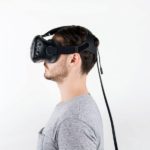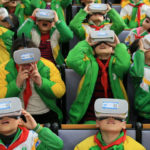Me & The Machine: Enter A New Reality in Our Unreal Times was produced by The National Research Group—with Verizon and RLab as consulting partners—and surveys 1,500 consumers.
4G arrived in force at the beginning of the 2010s, and brought with it a new mobile paradigm—allowing us to share and consume media at unprecedented speeds. It’s hard to imagine a time when live video sharing wasn’t just a commonplace, ubiquitous feature in messaging and social media apps—and for that we can thank 4G.
But this new world of instantaneous sharing and consumption also exacerbated widespread feelings of alienation and isolation—with half of Americans now identifying as lonely.
A decade into a world of 4G, how are consumers currently feeling about the rise of 5G in the 2020s—and the host of technologies springing up alongside it, which are set to amplify the digital landscape by an exponent?
A new study out today, Me & The Machine: Enter A New Reality in Our Unreal Times, takes a look at exactly this question—in the process indicating white spaces for next-generation experiences through unearthing unmet industry needs and barriers to adoption.
Produced by The National Research Group (NRG), with Verizon and RLab as consulting partners, the study analyzes consumers sentiment about 5G and emerging technologies and formats such as virtual reality, augmented reality, wearables, and holograms.
“5G will enable an entirely new era of consumer experiences, taking advantage of the super high speed, enormous capacity and ultra low latency of our 5G Ultra Wideband network,” said Frank Boulben, SVP of marketing and products in the Verizon Consumer Group, in a statement. “This study, and our early use cases, confirm consumers’ excitement and appetite for a future unlike anything today.”
NRG conducted a quantitative survey among 1,500 US consumers aged 13-54, as well as interviews with over twenty industry subject matter experts and consumer ethnographies at RLab and ArtCenter College of Design.
The major takeaway here is that consumers want to transcend the “lonely” reality of a 2D, 4G society—and move toward a more hopeful, socially connected world based on learning and self-discovery. While they voiced concerns of privacy in such a connected world, overall they expressed “cautious optimism” that such a world will arise.
“Consumers are ready for immersive experiences that can transcend the ills of the internet age and let them create their own reality―one in which personal growth and discovery trump consumption,” wrote National Research Group CEO Jon Penn in the report.
The study revealed that the “stickiest” (both exciting and useful) consumer experience for these new technologies is interactive learning/skill development, while identifying they four prevailing concerns about the proliferation of these technologies:
- Recording my data without my permission (40%)
- Keeping me from having privacy (35%)
- Feeling like my technology is “watching me” (33%)
- Featuring too much advertising/sponsored content (30%)
Evolving Frameworks for Media and Communication
Consumers expressed interest in “multidimensional communication and collaboration solutions beyond send and receive.” This includes new capabilities such as removing language barriers, hands-free interactions, and persistent, real-time collaboration capabilities. Consumers expect creators to produce interactive content that supports self-discovery and growth without impeding on their individual privacy, boundaries, and relationships.
The five use cases consumers identified as the most useful were:
- Remove language barriers (4.2x average demand)
- Interactive learning/skill development (2.7x average demand)
- Virtual assistant (1.7x average demand)
- “Shazam for everything” (1.4x average demand)
- Hands-free screens-on-the-go. (1.3x average demand)
As machine intelligence continues to proliferate and increase in capability, consumers resist living passively. The top next-generation consumer experience the study identifiesis interactive learning and skill development. In other words, consumers are most interested in learning by doing rather than simply perceiving.
Quelle:
Foto:
NATIONAL RESEARCH GROUP
https://www-forbes-com.cdn.ampproject.org/c/s/www.forbes.com/sites/jessedamiani/2019/12/12/new-study-reveals-cautious-optimism-about-5g-and-immersive-technologies-among-consumers-exclusive/amp/


